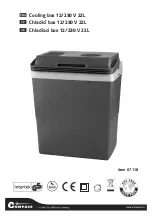
5 Assembly and siting
EN
22
Rittal Liquid Cooling Package
Heat losses in the adjacent server racks
If the LCP Inline or LCP Inline flush is used in combi-
nation with server racks with high heat losses, the
number of LCP Inline or LCP Inline flush units must be
adapted according to the characteristic curves (see
section 6.2 "Cooling operation and control character-
istics"). The air temperature difference between server
inlet and server outlet, which is determined by the
equipment used, is of particular interest. As a rule of
thumb, a temperature difference of 15 K can be ex-
pected. There may, however, be greater differences.
Air throughput in the adjacent server racks
Due to the containment of the hot and cold zones, it is
important to ensure that the LCP Inline or LCP Inline
flush delivers a sufficient amount of cold air into the
cold zone. From there, the cold air is drawn back into
the server enclosures by the equipment. A small sur-
plus of air should generally be provided in order to
compensate for any short-term demands of the equip-
ment.
Distances from the adjacent server racks
In small applications and short aisles, the above
points will not have a major impact on properties or
cooling capacity provided the hot zone is thoroughly
sealed off from the cold zone. For larger applications
and long aisles, however, even distribution of the cool-
ing units should be ensured, due to the loss of air
throughput caused by pressure changes and convec-
tion or radiation heat of the equipment. Other factors,
such as high-temperature rooms adjacent to the cold
zone or exterior walls warmed by the sun, can also oc-
cur.
5.2
Assembly procedure
5.2.1
General
Before the Liquid Cooling Package can be bayed onto
the server enclosure, the following work should be
carried out.
– Dismantle the side panels,
– Seal the server enclosure and
– Dismantle the server enclosure door.
5.2.2
Dismantle the side panels
If there is a side panel or partition mounted on the
server enclosure side to which the Liquid Cooling
Package is to be bayed, this must be removed first.
Loosen and remove the 8 assembly screws found
on each side panel of the server enclosure.
Remove all side panel securing elements from the
side of the server enclosure onto which the Liquid
Cooling Package is to be bayed.
Dismantle both side panel mountings from the up-
per mounting rail of the server enclosure, using an
appropriate lever.
Loosen and remove the screws on both of the side
panel mounting brackets (top and bottom) in the
middle of the mounting rail.
Loosen and remove the screws from the 6 side pan-
el holders on the side mounting rails.
5.2.3
Seal the server enclosure
In order to ensure targeted air routing in the system,
the server enclosure is vertically divided into hot air
and cold air zones by sealing the 482.6 mm (19") level.
Proceed as follows to seal the 482.6 mm (19") level:
If the server enclosure is only partially configured,
seal the open sections of the 482.6 mm (19") level
using blanking plates. Screw these tightly into the
server rack from the front.
Fasten the wider (Model No. 3301.370 / 3301.320) of
the two foam strips from the Liquid Cooling Package
accessories from outside onto one of the front sup-
ports of the server rack (fig. 21). Make sure to install
this strip on the side of the server enclosure onto
which the Liquid Cooling Package is to be bayed.
If you are only baying the Liquid Cooling
Package on one side:
Fasten the narrower (Model
No. 3301.380 / 3301.390) of the two foam strips from
the Liquid Cooling Package accessories from out-
side onto one of the front supports of the server rack
(fig. 21). Make sure to install this strip on the side of
the server enclosure which will again be sealed by
a side panel.
Caution! Risk of injury!
The side panel holders have sharp-edged
teeth, which enable earthing of the server
enclosure's side panel.
Note:
Blanking plates in the various height units
(U), together with both narrow and wide
foam strips and air baffle plates, are availa-
ble as Rittal accessories (see section 15 "Ac-
cessories").
































